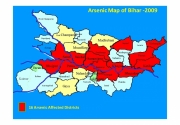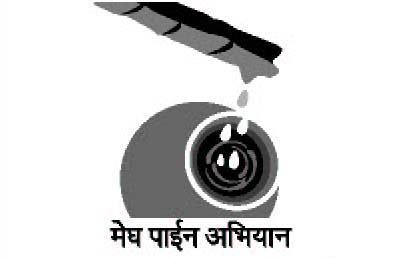/regions/bihar
Bihar
Tairne wala samaj doob raha hai: An essay by Anupam Mishra on the Bihar Floods
Posted on 18 Jun, 2010 09:55 PMSmall and big dams and big embankments were constructed in this region, without understanding the nature of the rivers which have always changed course or overshot their banks. Assuming however, that the river will not change course, the Government adopted a skewed development program - that of building embankments to contain the river.

Arsenic contamination of groundwater in Bihar and mitigation strategies - A research study
Posted on 12 May, 2010 11:24 PM This presentation deals with the problem of arsenic contaminated aquifers in the Gangetic belt of Bihar and the failure of the state government in tackling the crisis and calls for the establishment of a centralized knowledge & research hub with an understanding of the regional peculiarities to mitigate the crisis.
This presentation deals with the problem of arsenic contaminated aquifers in the Gangetic belt of Bihar and the failure of the state government in tackling the crisis and calls for the establishment of a centralized knowledge & research hub with an understanding of the regional peculiarities to mitigate the crisis.
It traces the origin of arsenic crisis to the switch from use of surface water to groundwater. The health impacts of arsenic poisoning and the factors that aggravate arsenicosis are explained. A total of sixteen districts (fifty-seven blocks) in Bihar are affected by high levels of arsenic in groundwater, in trivalent form, which is a more toxic form of arsenic.
A broken down school in Givha, Saharsa district, Bihar, destroyed in the floods after the Kusaha breached in 2008
Posted on 29 Mar, 2010 12:18 PMWhen the foundation stone for the Kosi embankment was laid on January 14, 1955, near Nirmali in Saharsa district in Bihar, euphoric people shouted, Aadhi roti khayenge, Kosi bandh banayenge (we will eat only half a chapati but we will surely build the embankment), writes the prolific engineer and activist Dinesh Mishra in his book, “ Trapped! Between the Devil and the Deep Waters.” No one really paid any attention to the protests and the fears of the people who would live with these embankments and what would happen to their lives.
Organising safe drinking water through community participation in flood-affected areas of Bihar - Case studies from the work of the Megh Pyne Abhiyan network
Posted on 22 Mar, 2010 02:08 AM This set of case studies (in hindi), details the work of Megh Pyne Abhiyan and their network partners - Gramyasheel and Samta, in organising safe drinking water in participation with the local village communities, in the flood affected West Champaran, Supaul and Khagaria districts of Bihar.
This set of case studies (in hindi), details the work of Megh Pyne Abhiyan and their network partners - Gramyasheel and Samta, in organising safe drinking water in participation with the local village communities, in the flood affected West Champaran, Supaul and Khagaria districts of Bihar.
State Government of Bihar is inviting comments from the public, on the Bihar State Water Policy Draft (2009)
Posted on 11 Mar, 2010 05:06 AMIn the context of the guidelines of the revised National Water Policy (2002) which require the states to prepare a comprehensive state-level water policy, and also the need to pay special attention towards the construction of new irrigation projects, along with water management, land management, food management, floods management, ecological balance etc, in the context of the various new developments and problems being faced by the state of Bihar over the last decade or so, the Water Resources Department of the State Government of Bihar has prepared a draft State Water Policy (2009) and is inviting comments from the general public.
Kosi Tragedy should be inquired by CBI
Posted on 22 Jan, 2010 02:05 PMPMO FORWARDS PETITION ON KOSI TRAGEDY TO HOME MINISTRY FOR APPROPRIATE ACTION
Prof.Suraj Yadav, Assistant Professor in Delhi University reports
Kosi breach due to Bihar government's apathy: PAG
Posted on 18 Jan, 2010 05:22 PMPatna, Jan 15 (PTI) The Principal Accountant General (PAG) of Bihar has indicted the state government for the breach in river Kosi embankment in 2008 that rendered lakhs of people homeless and claimed several lives.
Rs 52 lakh sanctioned for Kosi flood hit area disappears: Cheques go missing in Bihar
Posted on 18 Jan, 2010 03:41 PMA fraud in Kosi flood relief distribution has landed a government official in trouble in Bihar's Supaul district.
As many as 286 cheques allegedly went missing from the office of the block development officer (BDO) of Chhatapur in the district.
Inviting women researchers, journalists and activists
Posted on 28 Dec, 2009 04:00 PMLike majority of our rivers, Kosi too is a goddess - the daughter of Lord Shiva. Nicknamed `the sorrow of Bihar' by the male-dominated engineer-contractor -politician lobby, the river has been searching for its identity ever since. Ironically, most of what has been seen and written on the hydrological engineering imposed on the river has been by `men' only.
State of fisheries in the Gangetic basin
Posted on 10 Dec, 2009 03:51 PMInland fisheries form an integral part of the vast gangetic basin.